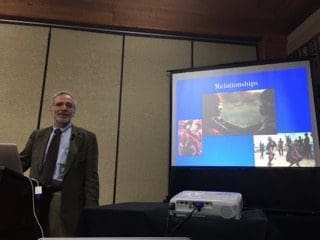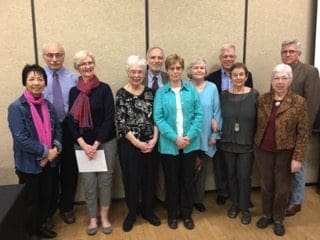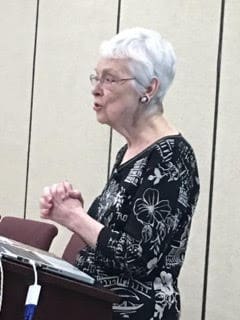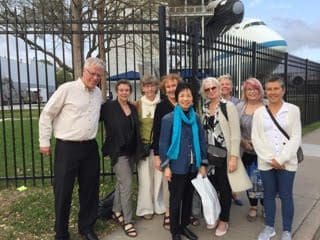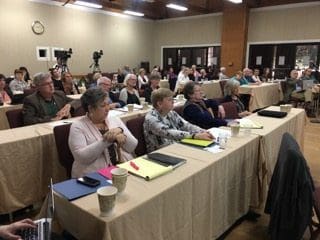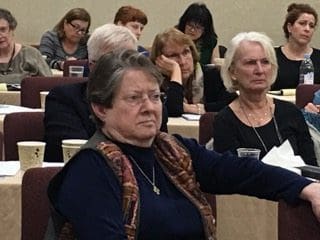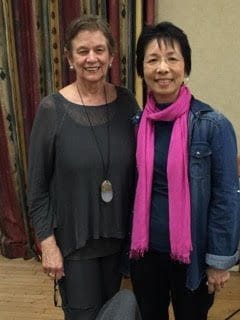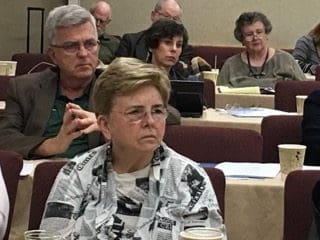CSNSF Third Symposium
Being Human:
Lessons from Nature, Science, and Bowen Theory on looking at ways the human adapts to a changing world for better and for worse
Thank you to those who attended!
The presentations and discussions were instructive, illuminating, and thought-provoking. And we want to know what you found helpful, meaningful, or noteworthy.
Order the DVD
If you didn't make it to the Symposium or you could benefit from reviewing the presentations. you can order the DVD and view the thinking at your leisure.
COMMENTS AND THINKING STIRRED
 John Bell, MDiv
John Bell, MDiv
Center for Family Consultation, contact here
“I found the discussion about the next 50 years to be fascinating. Whether or not we will find a way forward through the upcoming climate and environmental challenges. Dr. Konner's had some clear thoughts about that that were different from what others were presenting from a Bowen Theory perspective… I thought it was truly remarkable how many Bowen thinkers from around this globe were present at the symposium… I was thankful for the chance to speak to them and learn about how they are applying theory to in their settings.”
 Joanne Bowen, PhD
Joanne Bowen, PhD
Director, The Murray Bowen Archives Project, contact here
"It was interesting and useful to hear how Dr. Konner and Bowen theory-based presenters considered the challenges in contemporary society in light of evolution and family emotional process. I appreciate having had the opportunity to present my own work in this context. During the meeting, it became crystal clear to me that:
Societal regression is a time limited phase in societal emotional process. It is important not to confuse the two. Societies, like families, move into and move out of regression. Regression is fueled by many factors, including factors Murray Bowen identified (disharmony with the land, overpopulation, resource depletion, and disappearance of land to colonize).
Historical evidence and contemporary studies of foraging and agricultural societies show how the human’s connection to the land is grounded in the human family’s social relationships surrounding the procurement, production, and distribution of foods. In hunting and gathering societies families are organized in mobile groups of nuclear families, who move through their territory to harvest seasonally available resources. In non-industrial agricultural societies, families own land on which they grow crops and raise livestock, and they form ego-centered work groups to assist with the multitude of tasks related to producing food. In industrial agricultural societies, farmers retain access to land and labor relationships shift to hired labor, effectively separating ownership of the product from the labor that produces it.
These studies indicate that factors Murray Bowen identified, most poignantly as disharmony with the land, are driven at least in part by a shift from one production system to the another, where the very fabric of social relationships is altered, creating a societal-level disharmony between labor, land, and its resources. For straightforward descriptions of these adaptive strategies see Daniel Bates, Human Adaptive Strategies: Ecology, Culture, and Politics, Allyn and Bacon, 2nd or 3rd edition (2001 and 2004).
I look forward to connecting with others to further the work of many! On another note, I appreciate having had the opportunity to talk about The Murray Bowen Archives Project. Many expressed interest, and I look forward to continuing these conversations as well."
 Stephanie Ferrera, MSW
Stephanie Ferrera, MSW
Center for Family Consultation, contact here
“Just one week later, I find myself re-thinking my understanding of the evolving relationship between humans and the earth. I can't begin to list all of what I found valuable, but here are a few.
First would be the presence of Melvin Konner and the way he engaged throughout both days and evenings. His presentations and his interest in others' work, especially in Joanne Bowen's, were a joy to witness…Selecting him as the guest scientist [was a wise choice].
Second would be hearing Joanne Bowen present her extraordinary work as well as the mealtime conversations and beginning to get to know her. This is the first meeting that gave me such an opportunity. Her stories deepen my appreciation of her father.
Another is the quality of each and every presentation. With each one, I knew I was hearing the mature thinking and scholarship of a person who had put years into their understanding of Bowen theory and science. Veterans all.”
 LeAnn Howard, LSCSW
LeAnn Howard, LSCSW
contact here
“I thought the strength of the conference was the broad scope of presentations. The evolutionary biology presentations and Dr. Joanne Bowen's presentations anchored the two days in long-term thinking and the importance of learning from the past. Linking past, present, and future was considered throughout. I also thought complexity was at the heart of the thinking presented. A central thrust was focused on the importance of defining self within family. The current conditions of societal regression are an outcome of complex processes and changing conditions over time. The conference did not offer simple solutions to complex challenges.“
 Monica McGoldrick, LCSW, PhD
Monica McGoldrick, LCSW, PhD
The Multicultural Family Institute, contact here
"It was an extremely interesting experience for me-I was most excited about Joanne Bowen, Melvin Konner, and Peggy Chan's presentations about evolution in light of the current political times we’re living through and all the discussions throughout the 2 days- it was excellent."
 Jerry Miller, PhD
Jerry Miller, PhD
Executive Directer, The Evolution Institute, contact here
"'Nothing makes sense in biology except when seen in the light of evolution' (Theodosius Dobzhansky, 1973). I would stretch that statement to cover the social sciences as well. Evolution is the one unifying theory that crosses the biological and social sciences. It offers the potential to create a common language, that in turn, can lead to scientific exploration in a manner that creates a cross-disciplinary understand of phenomena, including behaviors. Speaking the same language, by itself, is a powerful way to advance science and will lead to greater understanding on a multitude of issues.
In my view, one of the most significant legacies of Bowen Family Systems Theory is viewing the behavioral and psychological aspects of humans through the lens of nature. Just as the shift of a geocentric view of the world led to a greater understanding of the solar system and beyond, shifting from a human centric view of nature is leading to a far more sophisticated understanding of how we, who stand on two legs, function. This I see as a profound shift and one we, as researchers, have barely begun to touch in terms of understanding and exploration.
As my personal understanding of the social aspects of our world gets deeper, the more I tend to think, that the true ‘ether’ we live within is the social environment. Evolution theory may, in the future, be able to say, ‘Nothing makes sense…except in light of the evolution of sociality.’ It appears that it is a major force in shaping our cognitive development as well as the more obvious emotional system. Our ability to manage social environments with non-kin who we don’t know or even see, is a key differentiator from other social animals.
It is within that context that Bowen’s work has, for me, great potential to add to our understanding. The Family Systems approach looks at individuals within the larger social context. While a number of sciences examine group behaviors, this approach attempts a theoretical understanding of individual functioning in a group context that is not simply an extension of individual-centric constructs.
It is a difficult road to get beyond that self-centric perspective in our culture. However, multiple disciplines appear to be poised for explosive growth in our understanding of this phenomena."
 Amie Post, MFT
Amie Post, MFT
The Bowen Center, contact here
“There is a reciprocity between human and nature and among humans that is ongoing and deep. Man’s brain emerged in its relationship to nature and to one another in such a way that it extended capacity to adapt and manage the challenges of existence – the brain of the human family (seen as one organism) provides more capacity to adapt and manage these challenges…Disruption of the relationship between human and nature (in which the family adaptation has originally occurred) as well as disruption to the family system through migration leaves human families facing a degree of intensity in adaptation that can provoke symptom development.”
 Ed Salmon, MBA
Ed Salmon, MBA
Contact here
"Regarding societal regression: as the symposium progressed I found myself wondering what state have we regressed from. When I hear the word regression that’s what I think about… movement from one state of being, a better one, to another state of being, a worse one. When Dr. Bowen thought of societal regression was his frame of reference WWII to around the time of his death? One might argue, especially someone who lived through WWII in Europe, that society hadn’t regressed at all. Or, was his frame of reference the beginning of human civilization to some point in the future when natural resources are depleted and society devolves?
In geology we often have to consider different scales. Huge tectonic scale forces create mountain chains, but they also create grain scale perturbations in the rock fabric. Sea level changes on a million year time scale leave certain patterns behind in the rock record that allow us to see and study those sea level changes. Imprinted on those million year sea level cycles can be thousand year sea level cycles, which also leave their telltale signs behind in the rock record. Where I’m going with this is that I think there might be many different scales imprinting themselves on one another when it comes to societal regression. One might say that broad scale societal regression has been occurring since we evolved. Imprinted on that may be smaller scale regressions. The Reformation & Dark Ages… The Civil War… WWII… Ethnic Cleansing in Africa… Donald Trump!
We see this throughout our history. Maybe we aren’t regressing at all. Maybe this is who we are.
[On another note], Dr. Konner spoke about the role that the male plays in societal regression, and the role that testosterone plays in driving the male to act, or react, the way that he does… aggressively. When I first started reading about Bowen Theory I came upon this idea of the identified patient. A family would bring a schizophrenic child to Dr. Bowen and say fix our child. Dr. Bowen observed that the child was part of a system and the child’s behavior had to be considered in the broader context of the family. Has the male, or testosterone, become the identified patient in this situation? Does it allow us to gloss over the role that we all play?"



